Female barista: please abandon sexism in the coffee industry
For professional baristas, please follow the coffee workshop (Wechat official account cafe_style)
"this is a coffee industry dominated by men. It seems that the concept of equality between men and women has long been forgotten by coffee practitioners. Now, as women, we have to make changes."
The ad, from the Tumblr home page of Douchey Dude Baristas (DDB), a coffee shop in Melbourne, Australia, uses emotional words to try to bring to the public the problems that are common in the coffee industry.
Perhaps we have noticed that more prominent positions and roles in the coffee industry are occupied by men, especially in competitive competitions, where women are rarely seen. It's the same with coffee roasting. You might ask: what kind of work do women do in the coffee industry?
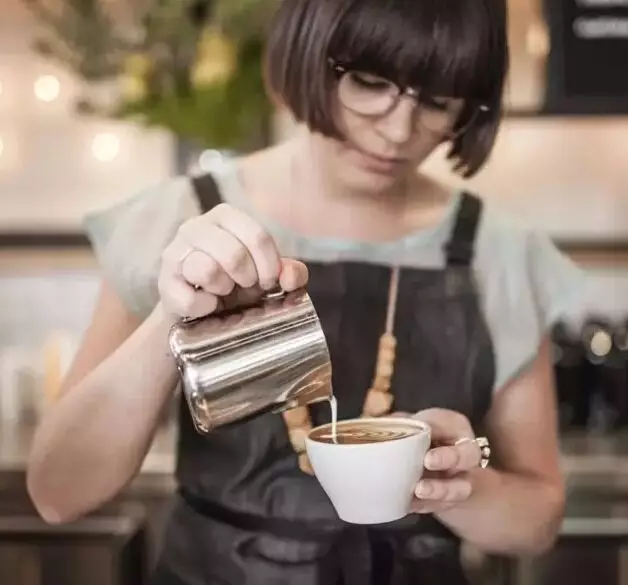
"although most of the workers in the catering industry are women, almost all management and leadership positions in the industry are occupied by men." Said Alex (not his real name), a professional barista and founder of DDB.
The concept of DDB Cafe is very avant-garde. It not only wants to make more people aware of the status of women in the coffee industry, but also aims to get more women involved in key positions in the coffee industry. The coffee shop has successfully launched a "Coffeewoman" interaction on Instagram, registered a "Barista Darlings" account to show "the elegant demeanour of female baristas around the world", and set up a "Smart Girls Make Coffee (SGMC)" network platform to let more people hear the voice of female coffee practitioners. The platform was inspired by Amy Poehler's "Smart Girls" and was fully supported by Andreea Varga at the beginning of its establishment.
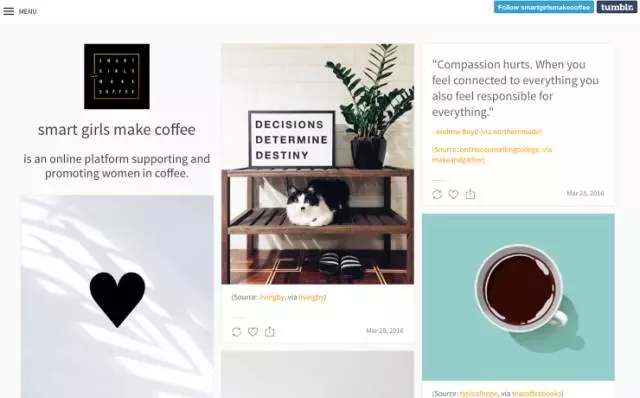
Although the concept of equality between men and women has been widely spread in today's society, almost all women in the coffee industry have been treated unfairly. Varga once emailed me to tell me that when she used La Marzocco Linea PB to make coffee in a coffee shop, the buttons on the machine didn't work very well and she had to try again. "A male barista said jokingly, maybe these buttons are made by women, so they don't work." Varga said, "I really have nothing to say."
Although DDB and SGMC use different channels and ways, their goal is the same, which is to make as many people as possible aware of gender discrimination in the coffee industry.
You may think, whether male or female, we all drink coffee, why has coffee become a male-dominated drink? In an article entitled "Espresso: A Shot of Masculinity" published in Food, Culture & Society magazine in 2007, author Julie Kjendal Reitz put forward the theory that "coffee is supposed to be a male drink, but its masculinity gradually disappears as it enters people's homes."
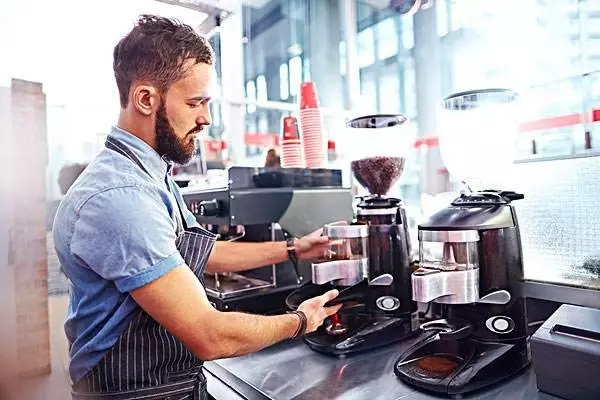
The person who recommended this article to me is Lisa Knisely, a freelance writer and sexologist from Portland, Oregon. "Coffee retailing seems to be like nurses and teachers, mostly female practitioners, but in fact, the real core profession, responsible for making coffee, are male workers," she said. Most of the jobs that men do are more 'professional', with higher social status and better wages, while it is difficult for women to participate. "
It's like the relationship between a doctor and a nurse. Doctors need more skills and work more professionally, which is considered to be the core profession of the medical industry, while less professional nurses are mostly held by women, as well as designers and tailors in the clothing industry. "and most of the jobs of men are more exposed to the public, while most of the jobs of women are more private and receive less attention. People naturally offer higher pay for higher-profile male occupations, while for female occupations, some even think that their jobs should be free. " Knisely said.
"this concept of 'male / public vs female / private' is deeply rooted in the Western world, from family to politics." "although the socio-political system varies from country to country, almost everyone has the same perception of the social status of men and women," she added. "
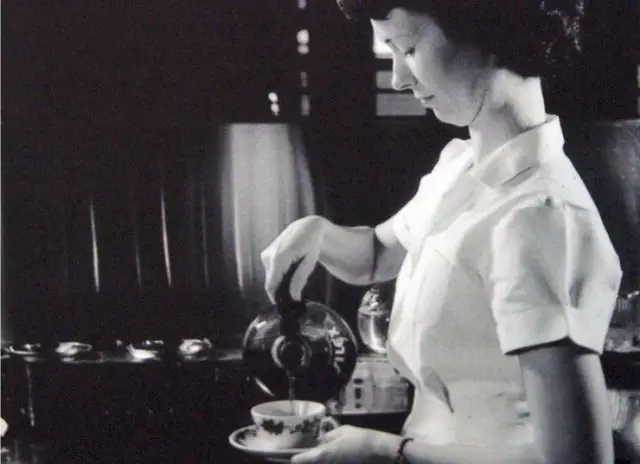
The coffee shop is even more special. The coffee shop is a public space, but it is also a "third type of space" for people to seek privacy (except at home and office). People want to taste professionally made coffee as well as comfortable and private service. This dual nature of the coffee shop naturally distinguishes the work and status of men and women. People think that men should be responsible for making coffee and women should be responsible for serving customers, which is the root of the problem of gender discrimination in the coffee industry. "consumers want professional baristas to make top coffee for them, while at the same time they want the service staff to talk to them and provide them with quality service, which is usually done separately by men and women." Knisely said.
"therefore, if we can eliminate gender discrimination in the coffee industry, we can fundamentally and culturally change people's minds and make everyone accept the fact that women can also take on more professional jobs." in turn, it plays a key role in the promotion of the status of women in society. " Knisely said.
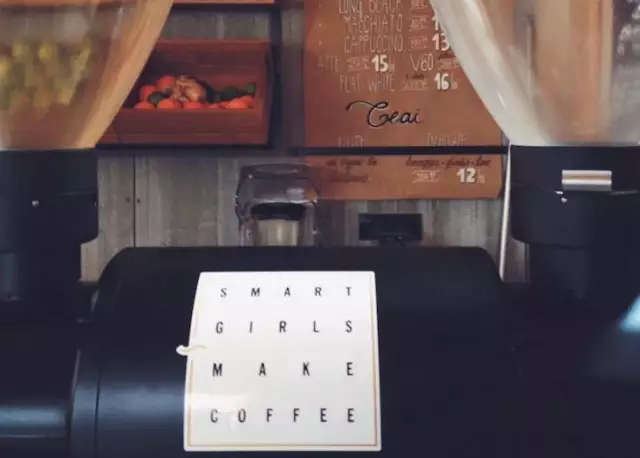
This is the goal of Alex, founder of DDB Cafe. She often receives all kinds of feedback on the website, and consumers have mixed opinions about their service. "I have the support of many women in the catering industry, and we have spoken the hearts and minds of all women." Alex said. But some people don't agree with it. "some people think that our remarks go too far and infringe upon the vital interests of some people." "but we know that it takes a long and arduous effort to get everyone to accept this idea," Alex said.
"We are not inheriting or continuing the work of male baristas, we are redefining baristas as women. We often ask ourselves: are there any other female baristas who have been treated unfairly? Which coffee shop still has this problem? Who else didn't join us? Why? " Alex said.
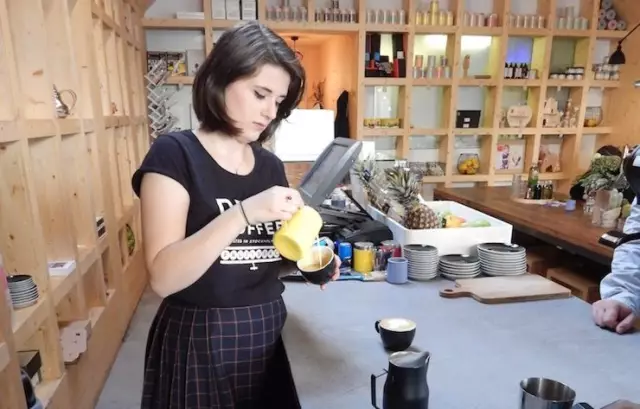
But it is easy to ask these questions, and it is even more difficult to change the status quo. For Varga, the purpose of her creation of SGMC is to provide more help to female workers, so as to fundamentally solve the problem of gender discrimination in the industry.
"I want to make more people aware of the issues I care about most." "I have to tell more people about my problems and difficulties," Varga said. I will especially help young women in their early 20s to tell them: real life is so cruel, maybe men can get approval after saying it, and we need to repeat it five times. "
More importantly, there is a need for more interaction among female practitioners. "female friends need more opportunities, but they also need more support, which is best from other female workers." "We have to unite all of us to make us stronger," Alex said.
Author
Anna Brones
Important Notice :
前街咖啡 FrontStreet Coffee has moved to new addredd:
FrontStreet Coffee Address: 315,Donghua East Road,GuangZhou
Tel:020 38364473
- Prev
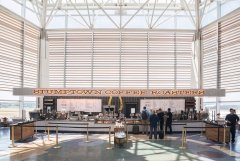
City of Wenqing Portland-"Tree Pier City" unexpectedly went to the airport to make coffee?
For professional baristas, please follow the coffee workshop (Wechat official account cafe_style). Stop saying that there is only rotten coffee in the airport! If you have the opportunity to travel to Portland, you can drink Stumptown Coffee Roaster at the airport! If you are a big coffee lover, you may know more or less about the good reputation of Stumptown Coffee Roaster. No.
- Next

Reality Coffee-Super Dream Rose Coffee, clock Tower shooting, Taichung good Coffee recommendation
Professional barista communication please follow the coffee workshop (Wechat official account cafe_style) A few months ago, because this dreamy cup of rose coffee made me notice Chengzhen Coffee, I thought at that time, I must find time to walk Chengzhen Coffee. It was only in May this year that there was a very lovely coffee shop in the newly opened Cafe in the audit new village. the Mutang, which is also my pocket list, is just Chengzhen Coffee next door.
Related
- What documents do you need to go through to open a coffee shop? coffee shop coffee shop certificate processing process
- How to purchase Coffee beans in small Cafe how to choose a suitable supplier for domestic Coffee supply Company
- How to drink Starbucks Fragrance White Coffee? how to make Australian White Coffee? what Italian coffee beans are recommended?
- The Story of Flora Coffee: the name of Flora Coffee Bean and the implication of the Flowers on Florna Coffee
- How much does a cup of coffee cost? How much is the profit of a cup of coffee? What is the profit of the coffee shop in a year?
- Yunnan small Coffee, known as "fragrant Coffee", introduces the characteristics of Alpine Arabica Coffee producing areas in Yunnan, China
- 2023 latest Starbucks full menu price list how much is a cup of Starbucks coffee what is better to drink the most popular hot and cold drinks recommended
- Starbucks different kinds of Coffee Price list Starbucks menu 2023 Top Ten Best drinks in Starbucks
- Starbucks Spring praise Comprehensive matching Coffee Bean theme Story Packaging implication and taste description
- The cost of a cup of coffee latte American coffee cost price and selling price

